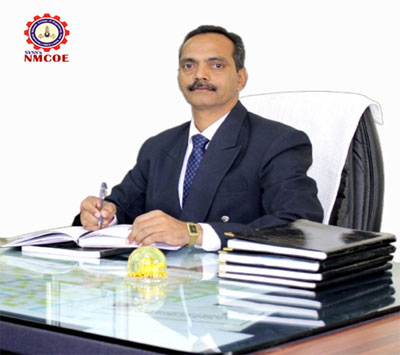
Shri Venkateshwara Shikshan Sanstha (SVSS) was founded in the year 2009 under the visionary leadership of Late Vanashri Nanasaheb Mahadik. Sir has very strong affection and attraction towards education. With this zeal and view to provide education to farmer's children at an affordable cost he has started an educational institutes for providing the education from KG to PG in a campus of around 35 acres at Peth-Naka.
Nanasaheb Mahadik College of Engineering (NMCOE) was established in the year 2011 and is one amongst the Institutes of SVSS. NMCOE is approved by AICTE, New Delhi and affiliated to Dr.Babasaheb Ambedkar Technological University (DBATU), Lonere, Dist. Raigad, and States first Technical Public University of the Maharashtra Government. The NMCOE is nestled in a vibrant, serene and green campus with the divine blessings of Lord Jyotirling and Goddess Mahalaxmi, at Peth, which is on the National highway (NH4) Connecting Pune to Kolhapur which move across the western hills. The institute is committed to produce all round engineers to drive the country through the 21st century.
During the last one and half decade the institute has been progressing vertically in the field of technical education and emerged as one of the fast growing institutes. NMCOE has received Accreditation by NAAC, Bangalore, and ISO 9001-2000 certification, and a Best Institution Award by Quick-Heal. The Institute has successfully completed various state level and national level activities viz. National Level "Vidnyan Pradarshan", state level Research Project Competition "Avishkar", Inspire AWARD Competition, State Level Job Fairs, etc. NMCOE has more than 25 MOUs with Reputed Industries for Training, Internship and Placements, Expert Talks, Bridge Course and skill up gradation of our engineering graduates. NMCOE always initiate the steps to improve the quality of technical education through these MOUs. It always takes initiatives to Inculcate Entrepreneur skill among its students and always hosts different activities through Entrepreneurship development cell.
Institute participates in all the activities organized by the Ministry of Education, AICTE, and DTE Maharashtra, DBATU and received good rating in ARIIA and allied ranking.
NMCOE has established various vibrant cells such as- IQAC, Training & placement, Career development, Entrepreneurship development, Innovation and Research, Alumni cell, Sports & Cultural cell-KALASARTHI, Women empowerment- UTKARSHA, and Vibrant Student Associations. All the students of the Institute participate through these cells in various activities and become an all-round engineer and get good placement. Some of the student have Started their own businesses, and some Students and faculties have got there Patent granted. More than 2500 Alumni of NMCOE are working in different distinguished positions in different organizations in India as well as abroad. These alumni have showcased their commitment, hard work and excellent performance in their Organizations and brought up very good name and glory to NMCOE, many alumni after graduation went for higher studies in engineering and management in India and abroad.
The far sighted educational vision of management has given a sense of direction to the development of the institute. The Institutional growth is guided by the spirit of being “Always Learning Organization”, which incorporate new and advanced process into the curricular and co-curricular activities to improve the quality of teachers learning. The NMCOE under the leadership of our Chairman, Secretary, Executive Director and all the members of governing council and All Teaching and Non-teaching Faculty always aspiring to train our students to face the challenges of 21st century.
Dr. Sunil Anekar
Principal, Nanasaheb Mahadik College of Engineering
